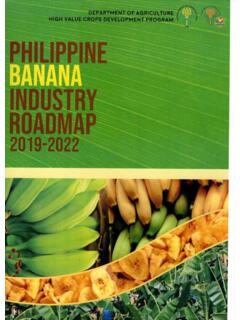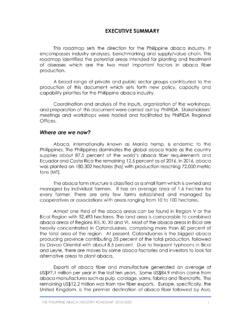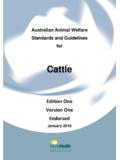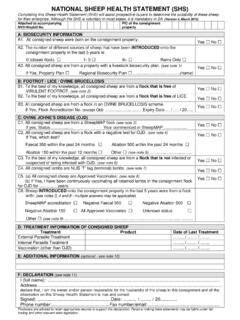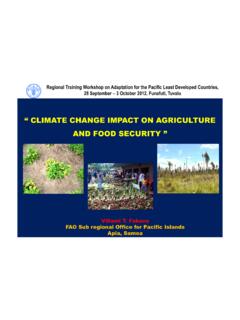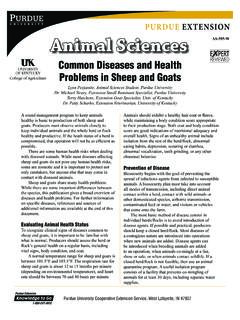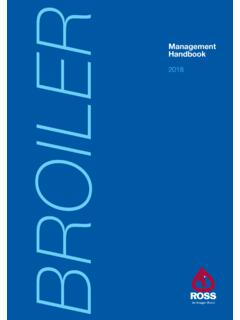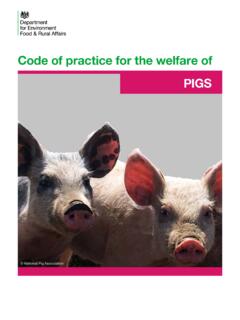Transcription of SUBJECT: IMPLEMENTING GUIDELINES FOR THE BANTAY ASF …
1 ADMINISTRATIVE ORDERNo. 0 7 Series of 2021 SUBJECT: IMPLEMENTING GUIDELINES FOR THE " BANTAY ASF SABARANGAY PROGRAMWHEREAS, in the exercise of the mandate of Section 7, Chapter 2, Book IV of Executive Order No. 292 entitled: Instituting the Administrative Code of 1987, the Secretary of the Department is empowered to promulgate rules and regulations necessary to carry out department objectives, policies, functions, plans, programs and projects; and issue administrative orders necessary for the efficient administration of the offices under the Secretary and for proper execution of the laws relative thereto;WHEREAS, African Swine Fever (ASF), a high impact transboundary animal disease (TAD), continues to affect the swine production sector of the Philippines with no vaccine and no known cure to date; resulting to industry estimate of 36% reduction of national swine inventory impacting both livelihood and agriculture economy.
2 WHEREAS, early reporting of animal-borne disease is vital for an efficient and well- coordinated response and immediate implementation of control measures;WHEREAS, successful control effort lies with strong collaboration between the Department of Agriculture, its relevant agencies, with concerned Local Government Units (LGU), and stakeholders taking ownership of such program benefitting the farmers;WHEREAS, the Philippine College of Swine Practitioners (PCSP), a collegial body of swine veterinarians, developed the " BANTAY ASF SA BARANGAY", a community- based approach to prevent, control, and manage ASF applying sound epidemiologic principles and available technology such as the use of ASF rapid test kits, through the cooperation of Local Government Units (LGU) and swine raisers, was successfully piloted in the province of Batangas with support from the local hog industry.
3 WHEREAS, local government officials including those in the barangays must be empowered considering their role as very critical in the successful implementation of disease control programs of the government, particularly ASF, at the grassroot level in order to timely detect, manage and prevent further spread of any disease;NOW, THEREFORE, pursuant to the abovementioned provisions of several issuances and memoranda, and to prevent and control the spread of ASF, and thereby facilitate the recovery of the hog sector, this Order is hereby promulgated and issued by the Department of Agriculture (DA] to implement the " BANTAY ASF SA BARANGAY PROGRAM" or "BABay ASF Program".SECTION 1. PROGRAM Description and ComponentsBantay ASF sa Barangay is a collaborative program of the Department of Agriculture (DA] under the National Livestock Program (NLP], the Department of Interior and Local Government (DILG], Academe, other relevant Government Agencies and the Private Sector which shall be implemented nationwide.))))
4 Technical and support services will be provided by DA, Academe and other relevant Government Agencies and the private sector, together with other swine industry experts to empower the Local Government Units (LGUs] who will actively involve themselves as frontliners in the battle against ASF. The following are the key components of the Program:a. Intensified Risk Assessment, Surveillance and Monitoring;b. Strengthening biosecurity Implementation;c. Capability Building and Awareness Campaign;d. Strengthening and Institutionalization of LGU Engagement; ande. Recovery and Scope. This Order applies to the intensified disease response of the Government against ASF, where the DA, academe, private stakeholders and swine industry experts provide technical and support services to empower LGUs in the implementation of the " BANTAY ASF SA BARANGAY" interventions at the farm and community levels.)
5 This is a joint flagship national program of various Government Departments to control and prevent ASF at the Barangay level involving disease surveillance and monitoring, disease reporting, disease investigation, disease response, the implementation of biosecurity protocols, zoning, recovery, and Objectivesa. To establish an effective ASF monitoring, surveillance and reporting system;b. To strengthen biosecurity measures at the farm level and border control;c. To intensify awareness campaigns and other capacity building activities;d. To strengthen and institutionalize LGU engagement for ASF prevention and control;e. To assist in the recovery and repopulation of previously affected areas; andf. To generate and mobilize resources for an effective implementation of food-secure and resilient Tlufippmeswitliprosperous farmers ancTfisHer/olkSECTION 2.
6 DEFINITION OF TERMSFor the purpose of IMPLEMENTING the provisions of these GUIDELINES , the following terms shall Animal Disease Diagnostic Reference Laboratory (ADDRL) is the nationalreference laboratory under the Bureau of Animal Industry that provides services in support to animal health and production, regulatory, research and surveillance in the whole African Swine Fever (ASF) is a severe viral disease that affects all breeds of domestic and wild pigs in the country and has already caused grave production and economic losses in Luzon and some parts of Visayas and Barangay biosecurity Officers (BBOs) are Community/Village-Based Animal Technicians (CBAT), Barangay Animal Health Workers (BAHW), para-veterinary workers, Barangay Livestock Aide (BALA), volunteer veterinarians who are not resident or consulting veterinarian of any farm , or any person assigned by the city/municipality at the Barangay shall also be known as Barangay biosecurity Officers or BBO who will be appointed, designated and registered as the frontliners of the BANTAY ASF SA BARANGAY PROGRAM and shall have specific responsibilities indicated in this biosecurity Level 1 refers to the level of farm biosecurity in compliance to minimum standards set by the Philippine College of Swine Practitioners (PCSP).
7 Bureau of Animal Industry (BAI) is the primary agency mandated to control animal diseases in the Commercial farm is a farm category for any farm with a swine population that exceeds the definition of small-hold farm . In high density areas, commercial farms are further classified Sem i-com m ercial farm which refers to at least one of the following: Between 10-50 sow level Between 41 to 500 Com m ercial farm which refers to at least one of the following: 51 sow level and above 501 fatteners and Community is hereby defined in this program as a barangay or clustering of Consulting Veterinarians refer to veterinarians employed in 300 sow-level farms and below as defined by the IMPLEMENTING Rules and Regulations (IRR) of Republic Act 8485 or the Animal Welfare Act of Contingency Plan outlines the needed plans and procedures in the event of an incursion of the Department of Agriculture (DA) is the Executive Branch of the Philippine Government mandated to improve, upgrade and regulate the agricultural Department of Agriculture Regional Field Office (DARFO)
8 Is the regional branch of the DA that facilitates and supervises the formulation and execution of policies, plans and programs of the Department in the respective Local Government Unit (LGU) is an administrative and political government unit subsidiary to the national government which could itself consist of sub-units as in the case of a province or a Paiwi/Paalaga pertains to the system of rearing animals in some areas in the Philippines whereby the care and management of few animals are delegated to individuals in a Regional Animal Disease Diagnostic Laboratory (RADDL) is agovernment laboratory under the DA Regional Field Office that provides services in support to animal health and production, regulatory, research and surveillance in the Resident Veterinarians refer to veterinarians employed in more than 300 sow-level farms as defined in the IRR of Republic Act 8485 or the Animal Welfare Act of Small-hold farm (PNS/BAFS 267:2019: Code of Good Animal Husbandry Practice (GAHP) for Swine) is most commonly known as backyard farm , which refers to at least one of the following.
9 Less than 21 heads of adult and zero head of young (1-20 heads adult and zero young and below) Less than 41 heads of young animals (1-40 heads young and below) Less than 10 heads of adult and 22 heads of young (1-9 heads adult and 1-21 heads young and below) Test and Destroy refers to the testing swine population and when found positive for ASF are subject for rapid, deliberate humane killing and proper Veterinary biosecurity Officers (VetBO) are Resident Veterinarians or Veterinary Consultants who shall be recognized as biosecurity Officers or VetBO. They shall be registered and deputized to act as such and perform the duties and responsibilities stated in this 3. INTENSIFIED RISK ASSESSMENT, SURVEILLANCE AND Disease MonitoringThe biosecurity Officers (VetBO and BBO) shall conduct ASF negative monitoring on a weekly basis.
10 Veterinary biosecurity Officers (Resident and Consulting Veterinarians) must submit weekly monitoring reports for commercial farms/paiwi to the CVO/MAO/MVO/PVO. In some cases, trained Barangay biosecurity Officers (BBO) can conduct the monitoring and reporting for semi-commercial farms up to 50 Sow Level and pa/w/'/farms up to 500 heads with the concurrence and approval by the LGU Officers must conduct and submit the farm biosecurity Evaluation Form for the farm to the CVO/MAO/MVO/PVO which also serves as a basis for concurrence of weekly diseases monitoring for ASF. Completeness of ASF weekly disease monitoring of biosecurity Officer will be among the basis of issuance/concurrence of Certificate of Weekly Disease Monitoring for African Swine Fever (see Annex 7].The detailed disease monitoring guideline is attached as Annex Disease InvestigationA disease investigation is prompted when there is a report of a suspect case of ASF in the area.)






